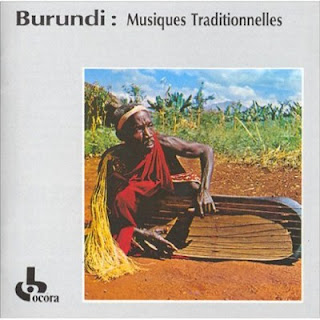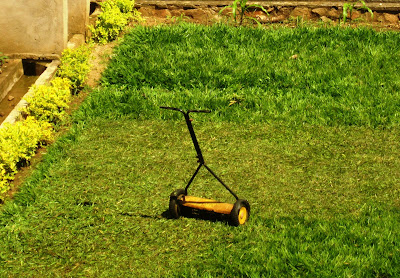 |
Doesn't everyone wish they could time travel back into the past??? Well, when we stepped on the last flight out of the U.S.A., we must have stepped into a time machine because we literally have gone back in time by at least 50 years.
|
 |
| Not only do we see many modes of travel by land........ |
 |
But we see many traditional things still used on a dailly basis. Tradition in Africa is very important! It is also very good for people to remember where they came from. I have seen this instrument in use.
These are the traditional Burundi Drums. We hear them weekly here. The local people love them and so do we.
Is the traditional music the only music? No, of course not but if there is more, it is usually on a radio. The average person does not own a radio. One of the workers here just got his first one. |
 |
| Many of the same skills that were used hundreds of years ago are still being masterfully used now. Pot and basket making are still wonderful art forms here in Burundi. |
 |
| There are no fast food restaurants here. This photo was actually taken in the Congo but it is the same here in Burundi. There are many "egg-boys" who sell boiled eggs on the street everyday. As you can see, they start out with many in the morning, walk about the city and sell many. They usually sell peanuts along with them. They even carry little packets of salt, if you would like. |
 |
| For the average people, machines are not available just good hard physical labor. |
 |
| Here, the use of carbon paper for receipts is the norm. In the more modern stores and businesses the receipts are carbon copied. |
 |
| In the stores that we shop for groceries, these are our receipts all hand written and checked over twice to make sure it is honest. Of course, the currency is Francs Burundian or FBU. |
 |
| This is the front yard of our apartment building. This is the motorless push mower our gardeners use. In this photo, you can see how far they have gone by the line of long grass waiting to be cut. It takes a day to cut a 12 ft by 12 ft. piece of lawn. They go over and over it until it is even. It takes 5 days to complete cutting the front and back lawn. Then, they start over again. |
 |
These newer kinds are on sale here in many hardware stores.
For those who cannot afford the push mower, which are most, they use a machete just like this. Many times they will bend 4 inches on the end into an "L" shape and swing the tip to cut the grass. We see this everyday. In the city, if there is a large stretch of land, there will be 4 or 5 men all swinging their machetes, as Elder Frogley says, "like a 9 iron"!
|
Remember the typewriter? Well, typewriters are on sale here as brand new items in the office supply stores.
 |
| Remember the cassette players? These are really for the high tech persons here. These are the newest recording items they carry, if they have them at all. The average person does not have one. |
 |
| This is a coal iron. You lift the top with the handle, put in your charbon, which is like charcoal, you have a hot iron in a few minutes. I see people ironing with these on "Mission Street" all of the time. It is really handy because there are not many electrical outlets and many times there is no electricity anyway when the power goes out. I cannot keep ironing with my iron when the power goes off. |
 |
| There are many open air products. The vendor will spread out his goods on a tarp and people come with their basket and buy what they need. This item is Cassava Root. They do this with beans, rice, grains, etc. There is no overhead for buildings or furniture or utilities....and no middle man. |
 |
Remember the treadle sewing machine?? My great grandmothers had these. No electricity needed. There are many, many of these in use everyday on the streets.
Here is a man on 'Mission Street" who uses his treadle machine to make men's suits. If the power goes off, no problem. His feet and legs just keep going!! |
Let's talk about garbage.This is the backyard of our apartment. Therefore, this is the system we use. All of the garbage in the apartment building goes into the old bathtub. These three men came to take the garbage. They empty it into large baskets. It is usually very wet and smelly from all of the rain. ICK!
Then they carry it to the front barrier gate, past the guard house and dump it into the waiting truck. It takes about 5 trips but it happens every week or so.
 |
| In the early picture on garbage you saw a barrier gate with a guard shack, where the guard sleeps all night. Here we are at the missionary apartment standing in front of their barrier gate. In the well - to - do areas there are large fences usually with razor wire on top and guards to open the gate when you drive up and honk twice. There are no garages or garage door openers. There is sometimes a carport inside the gate. On the outskirts of town the neighborhoods don't usually have fences and they homes a very close together. |
Cooking is another story. The average person uses these clay pot grills. They have no conventional ovens or stoves or microwave ovens. They put their pots on the charbon, which is like charcoal (you can see it here). It is alot like dutch oven cooking only trickier because they have no Dutch ovens. Most of their cookware is thin aluminum so it heats really fast and hot. Most of the pots have no lids so they do alot of stirring.
Here is one of our elders starting to prepare some food for their dinner. You can see they use the mortar and pestle on a regular basis. They grind up cassava root, manyoke leaves and bell peppers. They will also grind up corn and grains.
Here you also see that they do not have a washer or a dryer. Even the well to do people may have a washer but no dryer. We do not even have a dryer. But we do have a clothesline that works well.
Even though everything is done a bit slower, you have plenty of time to do it, because there are no distractions in your way...like television, movie theatres. People talk alot more and go to bed earlier....especially when the power goes out. People don't have alarm clocks but they have hundreds of birds to wake them up at dawn.
"...let every man esteem his brother as himself." D&C 38:25















